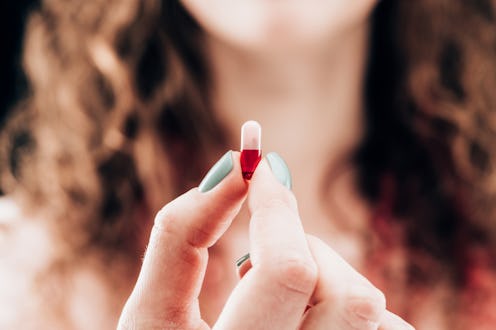Life
The Weird Way Switching Your Medication Can Mess With Your Dreams

If you've ever experienced depression or anxiety, taking medication can be a super helpful tool to manage your mental health. But sometimes your mental health is manageable without antidepressants (and if it's not, that's totally cool, too), so you and your doctor might decide to step you down from your medication. But what your doctor might not have told you when weening you off your medication is the weird way stopping antidepressants can affect your dreams. So if you've started to step down from your medication and suddenly have some wack-a-doo dreams, your medication could be the culprit.
Dr. David Neubauer, associate professor of Psychiatry and Behavioral Sciences at Johns Hopkins Medicine, tells Bustle that vivid dreams and nightmares are a common side effect when people are taking antidepressants, but there's little authoritative research on exactly why that is. "These medications tend to decrease the threshold for awakenings, so people are more aware of dreaming," Dr. Neubauer says.
Antidepressants were the only thing that helped pull me out of a major depressive episode, even after a decade of therapy. But after several years of taking them, my psychiatrist and I decided I was ready to try going without them. Just a few days into taking a lower dose, I had a nightmare so terrifying that I couldn't sleep for the rest of the night.
Others have reported having strange or alarming dreams while taking antidepressants, too. After starting antidepressants, Savannah Hemmig wrote for Femsplain, "My dreams are vibrant, rich and detailed. [...] Sometimes the gorgeous hyper-realism and detail of these dreams feels like a curse, especially after I have nightmarish dreams."
"[...] My dreams are insane," Gaby Dunn wrote for Thought Catalog. "They are vivid. They are cinematic. They are scary, not like a zombie apocalypse, but like a car accident or a heart attack."
Sleep specialist Dr. Michael Breus, also known as The Sleep Doctor, tells Bustle that antidepressants typically "knock out" REM sleep, so when you stop taking antidepressants, your REM sleep comes back "with a vengeance." "It is not uncommon for me to hear from clients, historically, that when they were [getting] off SSRIs that they had some 'weird and funky' dreams," says Dr. Breus.
Dr. Breus tells Bustle that your dreams might seem more real or vivid when you're getting off of medication because your brain is not used to dreaming, so your brain is treating those dreams like a whole new experience. And, according to SELF, each medication might affect your sleep and dreams differently.
“Generally speaking, these medications affect neurotransmitters like serotonin, dopamine, and norepinephrine,” board-certified sleep medicine doctor and neurologist Dr. W. Chris Winter of Charlottesville Neurology and Sleep Medicine and author of The Sleep Solution told SELF. "Depending on the antidepressant, you may find the medication enhances dreaming or your memory of dreams and nightmares."
Since strange dreams are associated with discontinuation symptoms, Dr. Neubauer says the best thing you can do is to step down from your medication slowly rather than stopping them suddenly. Dr. Neubauer also recommends using good sleep hygiene, like trying not to take naps, establishing regular bedtime routines, and getting some physical activity throughout your day.
The dreams you're having while taking or getting off medication might be super intense, but there's a medical reason behind it. If they're getting too overwhelming, you might want to talk to your doctor about other medications you can try. Or, if you're stepping down from medications like I was, just know that the dreams are temporary, and whatever you're dreaming about should go away eventually.